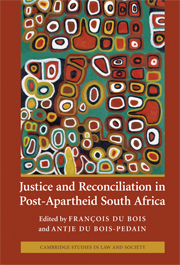Book contents
- Frontmatter
- Contents
- List of tables and figures
- List of contributors
- Acknowledgements
- List of abbreviations
- Introduction
- 1 Reconciliation as surrender: configurations of responsibility and memory
- 2 Radical forgiveness: transforming traumatic memory beyond Hannah Arendt
- 3 Communicating criminal and political responsibility in the TRC process
- 4 The contribution of criminal justice
- 5 Reparation and the forms of justice
- 6 Land restitution and reconciliation in South Africa
- 7 For justice and reconciliation to come: the TRC archive, big business and the demand for material reparations
- 8 Transition, forgiveness and citizenship: the TRC and the social construction of forgiveness
- 9 The evolving legitimacy of the South African Constitutional Court
- 10 Drawing the line: justice and the art of reconciliation
- 11 Post-conflict justice and the reconciliatory paradigm: the South African experience
- Index
- References
10 - Drawing the line: justice and the art of reconciliation
Published online by Cambridge University Press: 01 July 2009
- Frontmatter
- Contents
- List of tables and figures
- List of contributors
- Acknowledgements
- List of abbreviations
- Introduction
- 1 Reconciliation as surrender: configurations of responsibility and memory
- 2 Radical forgiveness: transforming traumatic memory beyond Hannah Arendt
- 3 Communicating criminal and political responsibility in the TRC process
- 4 The contribution of criminal justice
- 5 Reparation and the forms of justice
- 6 Land restitution and reconciliation in South Africa
- 7 For justice and reconciliation to come: the TRC archive, big business and the demand for material reparations
- 8 Transition, forgiveness and citizenship: the TRC and the social construction of forgiveness
- 9 The evolving legitimacy of the South African Constitutional Court
- 10 Drawing the line: justice and the art of reconciliation
- 11 Post-conflict justice and the reconciliatory paradigm: the South African experience
- Index
- References
Summary
INTRODUCTION
In conversation with Angela Breidbach, South African artist and film-maker, William Kentridge, speaks about his early interest in art:
I come from a very logical and rational family. My father is a lawyer. I had to establish myself in the world as not just being his son, his child. I had to find a way of arriving at knowledge that was not subject to cross-examination, not subject to legal reasoning.
Kentridge presents artistic and legal practices as being entirely different to each other, yet the creative process of making a drawing, for Kentridge, involves a movement that is partly ‘projection’ and partly ‘reception’ of an emergent image – it has to do with ‘what you recognize as the drawing proceeds’. This act of projection, reception, and hence of recognition, also applies to the event of viewing a drawing, and it is in this context that I discuss the implications of ‘drawing the line’ in all its ambiguity. Drawing a line in the literal sense – as a graphic artist would – is a gesture that may not be subject to legal reasoning (to use Kentridge's phrasing), but at the same time, in the drawing's address to those who view it, the artwork depends upon and anticipates a ground of recognition. It thus sets perimeters to a potential field of response.
- Type
- Chapter
- Information
- Justice and Reconciliation in Post-Apartheid South Africa , pp. 267 - 288Publisher: Cambridge University PressPrint publication year: 2009
References
- 2
- Cited by



